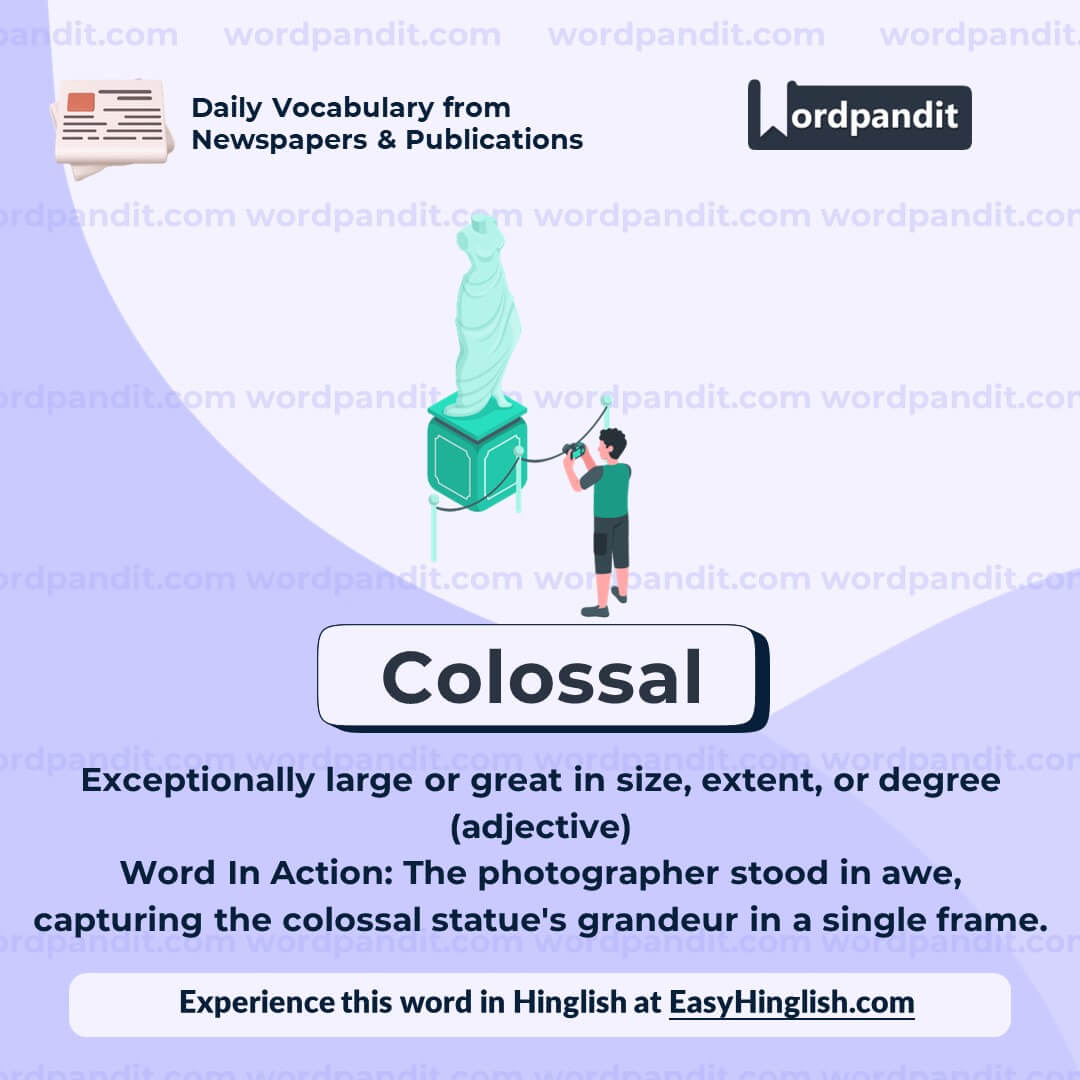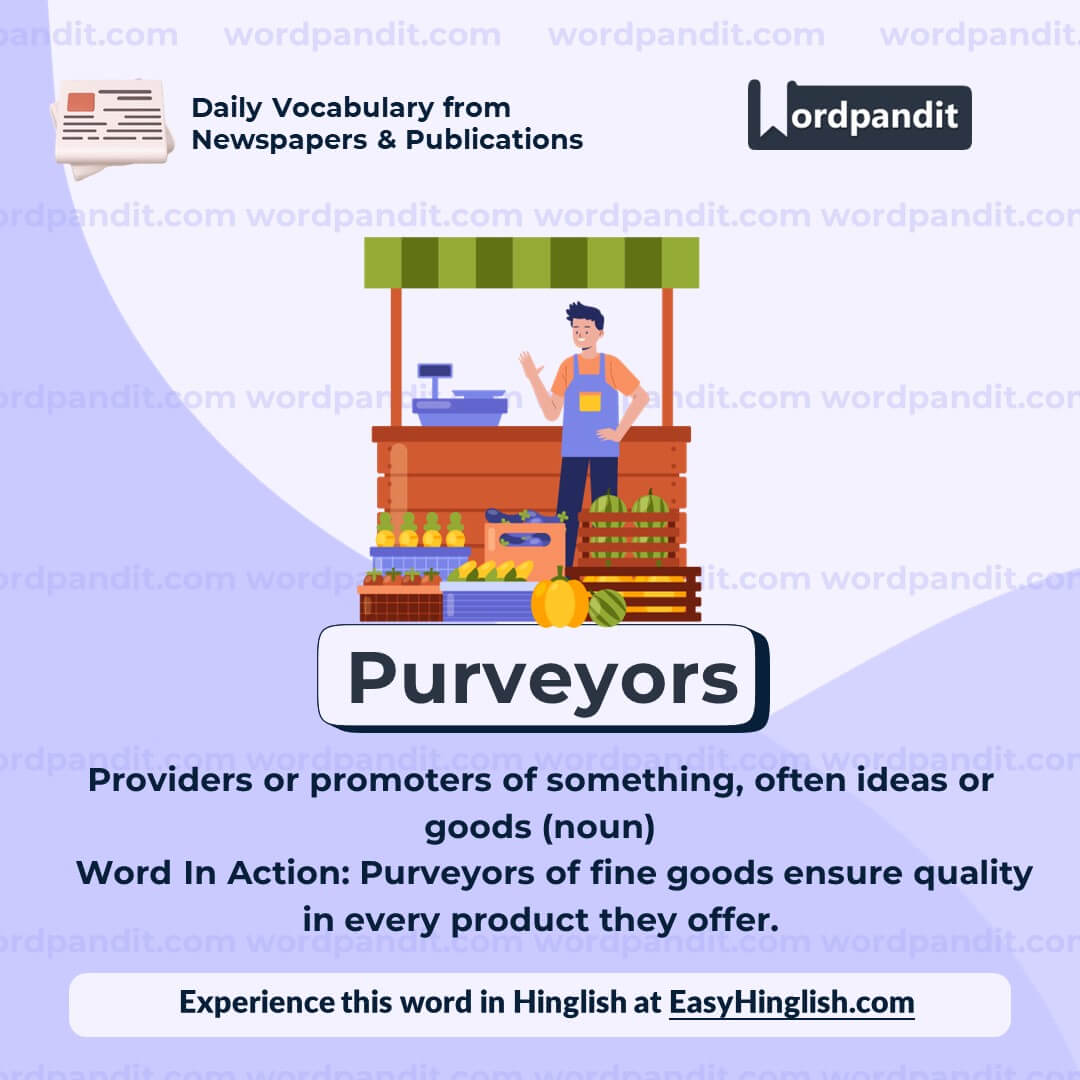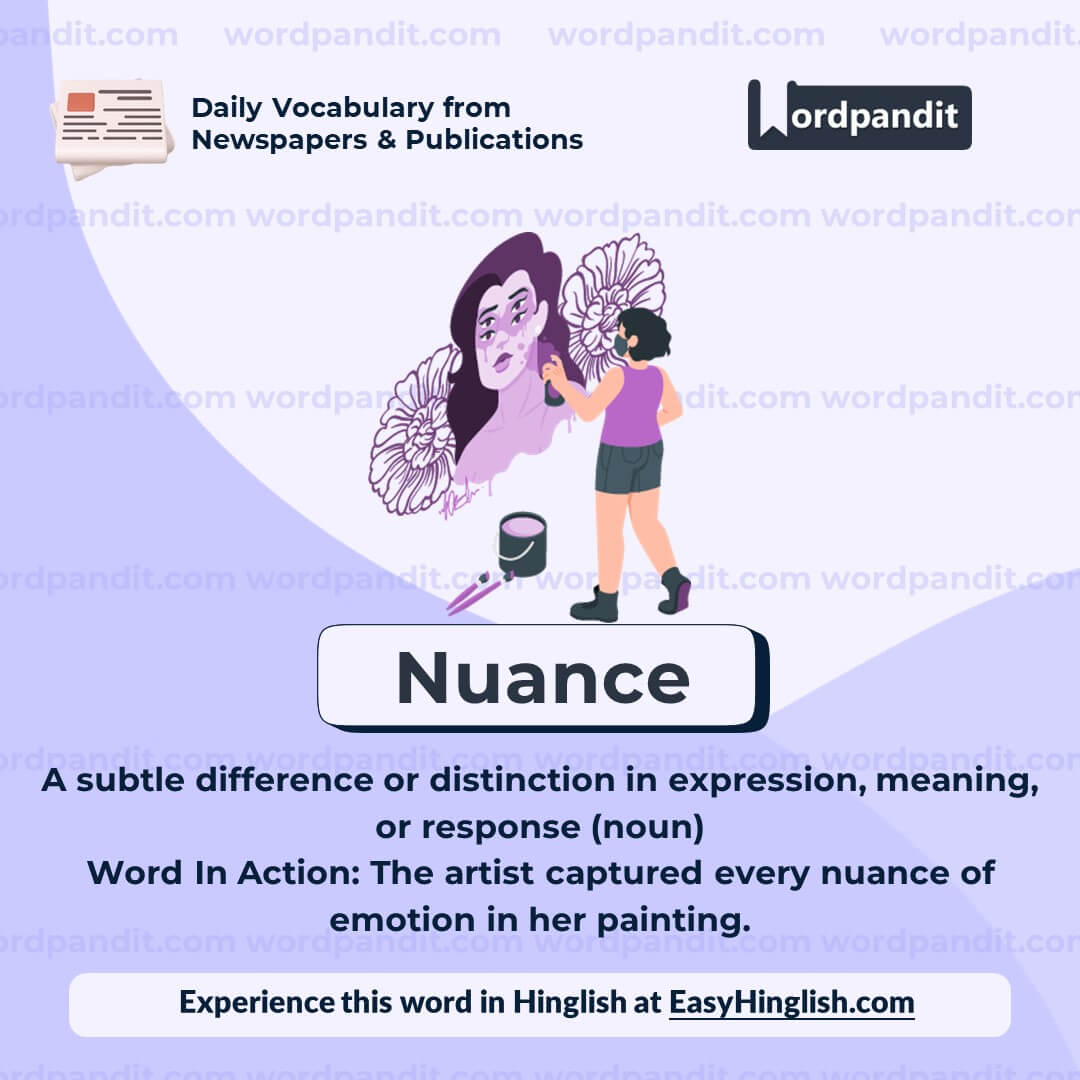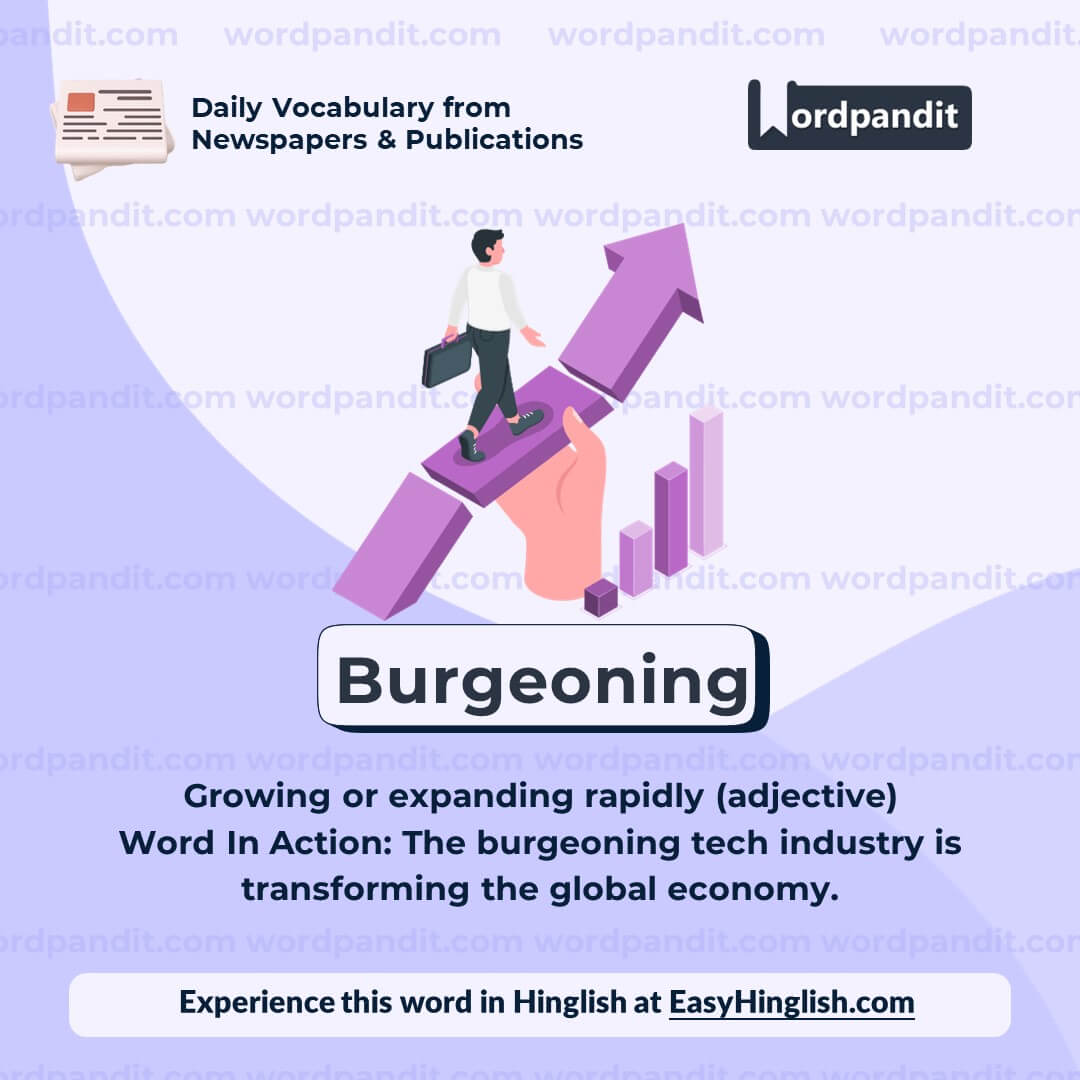Daily Vocabulary from International Newspapers and Publications
Expand Your Vocabulary with Wordpandit’s Global Vocabulary Hub
At Wordpandit, we are committed to helping you develop a truly global vocabulary by drawing from some of the most respected international publications. This section is designed to keep you ahead of the curve by introducing you to words that define global conversations and trends.
The Power of Global Sources
To help you think and communicate on a global scale, we curate vocabulary from renowned international sources, such as:
- The New York Times
- The Washington Post
- BBC
- The Guardian
- The Economist
- Scientific American
- Psychology Today
- And many more...
Stay Global, Stay Competitive
Our daily updates from international publications ensure you are consistently exposed to new words that reflect global news and developments, making sure your vocabulary is not only current but also globally relevant.
Enhance Your Global Perspective
Whether you’re preparing for international exams, aiming to excel in global business communication, or want to enhance your language skills for personal growth, Wordpandit offers the resources you need to thrive in a global context.
Effective Learning, Global Reach
Our learning methodology combines global examples, memory aids, and interactive activities, allowing you to internalize new words effectively and apply them in real-world scenarios.
Begin Your Global Vocabulary Journey Now!
Why Choose Wordpandit?
Practical Learning: Focus on words you'll actually encounter in real-world reading, enhancing your comprehension and communication skills.
Diverse Content: From current affairs to scientific breakthroughs, our varied sources expose you to vocabulary across multiple domains.
Effortless Integration: Make Wordpandit a part of your daily routine. Just a few minutes each day can significantly boost your lexicon over time.
Your Path to Vocabulary Mastery
- Visit our Daily Vocabulary section regularly
- Explore new words and their usage in context
- Practice incorporating these words into your own writing and speech
- Track your progress as your vocabulary expands
Start Your Journey Today
Embark on your vocabulary enhancement journey with Wordpandit. By consistently engaging with our daily posts, you'll build a robust vocabulary that serves you well in academic, professional, and personal contexts.
Remember, a word a day keeps linguistic limitations at bay. Make Wordpandit your daily companion in the quest for vocabulary excellence!
WORD-1: Figments
Context:
"How true to life, they would always remain figments, unlike the imperceptible particles I detected in the laboratory. I could never empathize with protons, electrons and other particles, but they remained more real than the complex protagonists of Spanish literature." - Aeon
Explanatory Paragraph:
The word "figments" refers to things that exist only in the imagination and are not real. In the context of the quote, it highlights a contrast between abstract ideas or fictional constructs and the tangible, scientific particles studied in a lab, emphasizing the disparity between perceived reality and conceptual or imaginary entities.
Meaning: Something made up or imagined (noun)
Pronunciation: FIG-ments
Difficulty Level: ⭐⭐ Beginner
Etymology: Derived from the Latin "figmentum," meaning "an invention or fabrication," which in turn comes from "fingere," meaning "to shape or form."
Synonyms & Antonyms:
Synonyms: Fantasy, illusion, invention, fabrication
Antonyms: Reality, truth, fact
Usage Examples:
- The monster under the bed was nothing more than a figment of the child’s imagination.
- Her claim that she saw a UFO was dismissed as a figment of her overactive mind.
- The intricate backstory of the novel’s protagonist was a pure figment of the author’s creativity.
- He often confused dreams with reality, making it difficult to distinguish fact from figments of his imagination.
Cultural Reference:
In the movie *Inception*, the line between reality and figments of the imagination becomes increasingly blurred as the characters navigate through layers of dreams. - Source: Film Reference
Think About It:
Why do figments of the imagination often feel as real or even more vivid than tangible experiences?
Quick Activity:
Write down two situations where something you imagined turned out to be completely different from reality. Share how it made you feel.
Memory Tip:
Think of "figment" as "fiction" + "segment," emphasizing a small piece of imagination or fiction.
Real-World Application:
The term "figments" is frequently used in creative fields, such as writing and filmmaking, to describe imagined scenarios, characters, or settings that add depth to storytelling. It’s also a useful term in philosophical or psychological discussions about the nature of reality.
WORD-2: Colossal
Context:
"The New Japanese Minimalism (2015) reframed clutter as a dire threat to mental health and spiritual growth. They have become colossal hits in the United States and other countries. However, as the world turns to Japan to tidy up." - Aeon
Explanatory Paragraph:
The word "colossal" describes something of immense size, importance, or impact. In the context, it emphasizes the massive popularity and influence of Japanese Minimalism, which has gained significant traction worldwide due to its profound implications for mental and spiritual well-being.
Meaning: Exceptionally large or great in size, extent, or degree (adjective)
Pronunciation: kuh-LOSS-ul
Difficulty Level: ⭐⭐ Intermediate
Etymology: Derived from the Latin word "colossus," meaning a giant statue, and later used metaphorically to signify anything gigantic or monumental.
Synonyms & Antonyms:
Synonyms: Gigantic, enormous, immense, monumental
Antonyms: Tiny, small, insignificant, trivial
Usage Examples:
- The construction of the Great Wall of China was a colossal undertaking that spanned centuries.
- The company made a colossal error in underestimating the competition’s capabilities.
- The movie’s colossal success took even the filmmakers by surprise.
- The new skyscraper dominates the skyline, a colossal testament to modern architecture.
Cultural Reference:
The Colossus of Rhodes, one of the Seven Wonders of the Ancient World, was a colossal statue symbolizing the strength and resilience of the people of Rhodes. - Source: History Books
Think About It:
How can something "colossal" in size or influence shape the way people think or behave?
Quick Activity:
Write three sentences describing "colossal" achievements in science, history, or culture. Share what makes them remarkable.
Memory Tip:
Picture the Colossus of Rhodes, an ancient wonder of colossal size, to remember the word’s meaning of "giant or monumental."
Real-World Application:
"Colossal" is often used in journalism, business, and everyday speech to emphasize the extraordinary scale of events, projects, or outcomes, such as describing a "colossal breakthrough" in technology or a "colossal failure" in strategy.
WORD-3: Purveyors
Context:
"I was, almost certainly wrong. Both are the purveyors of real and imagined worlds. Both are interrogators of the intangible, posing some of our broodiest questions about existence." - Aeon
Explanatory Paragraph:
The word "purveyors" refers to individuals or entities that supply or promote something, often goods, ideas, or experiences. In the context of the quote, it highlights those who provide access to or convey both real and imagined perspectives, enriching our understanding of existence and the intangible aspects of life.
Meaning: Providers or promoters of something, often ideas or goods (noun)
Pronunciation: per-VAY-ers
Difficulty Level: ⭐⭐⭐ Intermediate
Etymology: Derived from the Old French "porveier," meaning "to supply or furnish," which traces back to the Latin "providere," meaning "to foresee or provide."
Synonyms & Antonyms:
Synonyms: Suppliers, vendors, providers, promoters
Antonyms: Consumers, recipients, beneficiaries
Usage Examples:
- The bookstore became a purveyor of rare and antique manuscripts for collectors worldwide.
- Social media platforms act as purveyors of both credible information and misinformation.
- The chef is a renowned purveyor of organic and sustainably sourced ingredients.
- Philosophers have long been purveyors of deep and challenging questions about human existence.
Cultural Reference:
The term "purveyor" gained cultural significance during the Renaissance, as artists and thinkers were seen as purveyors of new ideas, shaping cultural and intellectual movements. - Source: Art History Texts
Think About It:
What qualities make someone an effective purveyor of ideas or goods, and how do they influence society?
Quick Activity:
Identify a company or individual you consider a purveyor of innovation. Write a short paragraph explaining your choice.
Memory Tip:
Link "purveyors" with "providers," as they both start with "pur" and involve supplying something to others.
Real-World Application:
The word "purveyors" is frequently used in business, arts, and media to describe individuals or organizations that distribute or promote specialized products, services, or ideas, often shaping trends and preferences.
WORD-4: Nuance
Context:
"That reveals a far more complex and nuanced relationship with stuff, one that suggests minimalism and clutter aren’t opposites, but two sides of the same coin." - Aeon
Explanatory Paragraph:
The word "nuance" refers to a subtle or slight difference in meaning, expression, or tone. In the context of the quote, it highlights the complexity of the relationship between minimalism and clutter, suggesting that they are not absolute contrasts but share intricacies that require a deeper understanding.
Meaning: A subtle difference or distinction in expression, meaning, or response (noun)
Pronunciation: NOO-ahnce
Difficulty Level: ⭐⭐⭐ Intermediate
Etymology: Borrowed from French "nuance," meaning "shade or subtlety," which comes from "nuer," meaning "to shade."
Synonyms & Antonyms:
Synonyms: Subtlety, distinction, refinement, delicacy
Antonyms: Bluntness, obviousness, simplicity
Usage Examples:
- The artist’s use of light and shadow added nuance to the painting, making it more captivating.
- The debate was filled with nuance, as both sides presented thoughtful and layered arguments.
- Understanding the nuances of cultural traditions requires both respect and careful observation.
- The writer’s nuanced portrayal of the character made her seem authentic and relatable.
Cultural Reference:
In diplomacy, "nuance" is vital. For example, the tone and choice of words in treaties and agreements often carry nuanced meanings that influence international relationships. - Source: Political Science Journals
Think About It:
How does paying attention to nuance in communication help in avoiding misunderstandings?
Quick Activity:
Describe a situation where a subtle nuance in tone or expression changed the outcome of a conversation or event.
Memory Tip:
Think of "nuance" as a "new ounce" of meaning, where even a small difference can add depth to understanding.
Real-World Application:
"Nuance" is an essential concept in areas such as communication, art, literature, and leadership, where small distinctions or subtleties often make a significant impact in interpretation or decision-making.
WORD-5: Burgeoning
Context:
"Though the country remained difficult to visit in person, the opening allowed a burgeoning Pacific trade to bring Japanese wares to the citizens of the world by the literal boatload." - Aeon
Explanatory Paragraph:
The word "burgeoning" describes something that is growing or developing rapidly. In the context of the quote, it refers to the rapid expansion of Pacific trade, which facilitated the widespread distribution of Japanese goods to a global audience, marking an era of significant economic and cultural exchange.
Meaning: Growing or expanding rapidly (adjective)
Pronunciation: BUR-juh-ning
Difficulty Level: ⭐⭐ Beginner
Etymology: Derived from the Old French "bourgeonner," meaning "to bud or sprout," which in turn comes from "bourgeon," meaning "bud."
Synonyms & Antonyms:
Synonyms: Growing, expanding, thriving, flourishing
Antonyms: Declining, shrinking, stagnating, withering
Usage Examples:
- The burgeoning tech industry has transformed the city into a global innovation hub.
- Her burgeoning interest in photography led her to enroll in a professional course.
- The burgeoning popularity of electric vehicles is driving significant changes in the auto industry.
- The artist’s burgeoning talent was evident in her latest collection of paintings.
Cultural Reference:
The term "burgeoning" is often used in literature to describe the rise of cultural movements. For instance, the Renaissance was a burgeoning era of art and science, laying the foundation for modern thought. - Source: History Texts
Think About It:
What factors contribute to the burgeoning of new industries, and how can they sustain long-term growth?
Quick Activity:
Write a sentence describing a burgeoning trend or movement you’ve observed recently. Share why you think it’s gaining popularity.
Memory Tip:
Think of "burgeoning" as a "bud growing," emphasizing the idea of rapid development, much like a plant sprouting quickly.
Real-World Application:
"Burgeoning" is commonly used in news articles, business reports, and everyday conversations to describe fast-growing trends, markets, or interests, making it an essential word for discussing dynamic changes and developments.
















